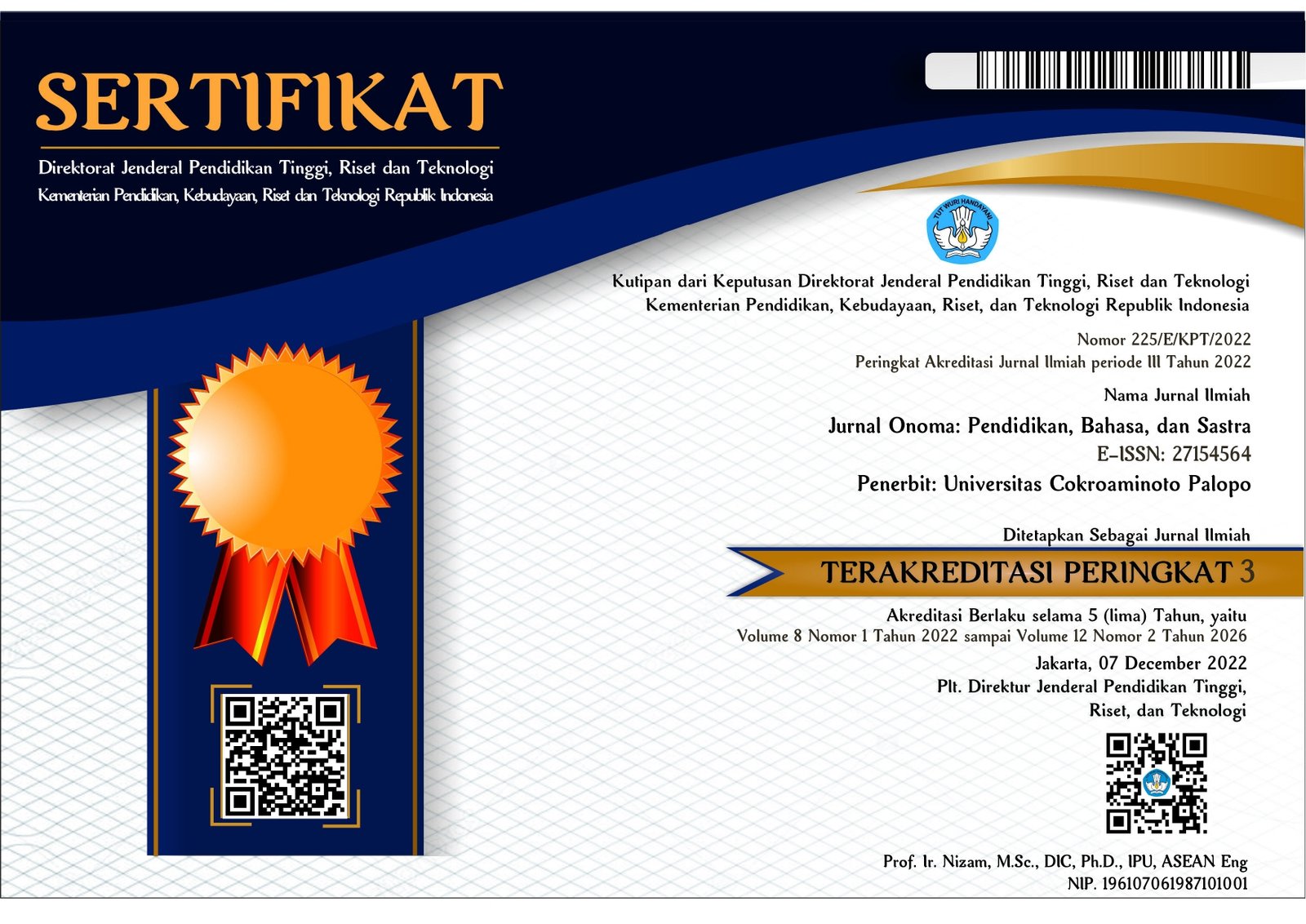Problematika Pembelajaran Berpikir Kritis Teks Eksposisi di MTsN 6 Malang
https://doi.org/10.30605/onoma.v11i1.4979
Keywords:
problematika, berpikir kritis, eksposisiAbstract
Penelitian ini mengeksplorasi problematika dalam pembelajaran berpikir kritis teks eksposisi di MTsN 6 Malang. Berpikir kritis merupakan keterampilan penting yang diperlukan untuk memahami, menganalisis, dan mengevaluasi informasi secara objektif. Dalam praktiknya, pembelajaran keterampilan berpikir kritis melalui teks eksposisi sering kali menghadapi berbagai tantangan. Data penelitian dikumpulkan melalui observasi kelas, wawancara dengan guru, serta analisis dokumen pembelajaran. Temuan penelitian ini menunjukkan bahwa terdapat beberapa problematika diantaranya pengembangan tujuan dan indikator dalam rencana pelaksanaan pembelajaran belum mengarah pada indikator berpikir kritis. Dalam pelaksanaan pembelajaran siswa belum terbiasa dengan pola analisis dan diskusi yang mendalam dengan berbagai sudut pandang. Dalam perangkat asesmen kemampuan berpikir kritis masih perlu ditingkatkan, terutama dalam variasi metode asesmen dan kualitas umpan balik yang diberikan kepada siswa.
Downloads
References
Agustiningsih, dkk. (2022). Model Pembelajaran Berbasis Proyek Untuk Menulis Teks Eksposisi di Sekolah Menengah Pertama. https://conference.um.ac.id/isolec/article
Cahyanto, Z. D., Basuki, I. A., & Martutik. (2016). Pengembangan Instrumen Asesmen Membaca Kritis Untuk Siswa SMA/SMK Kelas X dan XI. Jurnal Pendidikan, 1(5), 780–784. http://journal.um.ac.id/index.php/jptpp/article/view/6256/2672
Dhini, M. S., Sunarti, I., & Riadi, B. (2019). Pengembangan Instrumen Penilaian Berbasis Hots (Higher Order Thinking Skill) Teks Deskripsi SMP Kelas VII. Jurnal Kata (Bahasa, Sastra, Dan Pembelajarannya), 1–6. https://core.ac.uk/reader/291695482
Fadhlullah, A., & Ahmad, N. (2017). Thinking Outside of the Box: Determining Students’ Level of Critical Thinking Skills in Teaching and Learning. Asian Journal of University Education, 13(2), 51–70.
Manurung, A. S., Hasanah, M., & Siswanto, W. (2020). Instrumen Asesmen Berpikir Kritis Dalam Pembelajaran Membaca Teks Eksposisi untuk Siswa Kelas VIII SMP. Jurnal Pendidikan: Teori, Penelitian, Dan Pengembangan, 5(6), 730–736. https://doi.org/10.17977/jptpp.v5i6.13583 DOI: https://doi.org/10.17977/jptpp.v5i6.13583
Mareza, N., Susetyo, & Kurniawan, R. (2020). Pelaksanaan Pembelajaran Teks Eksposisi Berdasarkan Kurikulum 2013 (K13) pada Siswa Kelas VIII SMP Negeri I Kota Bengkulu Tahun Ajaran 2018-2019. Jurnal Ilmiah Korpus, 4(1), 73–79. https://ejournal.unib.ac.id/index.php/korpus
Mukarramah, M., Gani, A., & Winarni, S. (2021). Analisis Kesesuaian Perangkat Pelaksanaan Pembelajaran dengan Tuntutan Pembelajaran Abad 21. Jurnal IPA & Pembelajaran IPA, 5(3), 233–241. https://doi.org/10.24815/jipi.v5i3.21934 DOI: https://doi.org/10.24815/jipi.v5i3.21934
Muttaqiin, A., & Sopandi, W. (2016). Pengaruh Model Discovery Learning dengan Sisipan Membaca Kritis Terhadap Kemampuan Berpikir Kritis Siswa. Edusains, 8(1). https://doi.org/10.15408/es.v8i1.1752 DOI: https://doi.org/10.15408/es.v8i1.1752
Nurhayatin, T. (2018). Pengembangan Model Problem Based Learning Sebagai Upaya Meningkatkan Kemampuan Menulis Teks Eksposisi dan Kemampuan Berpikir Kritis Siswa SMA. Aksara, 6(1), 1–18. http://publikasi.stkippgri-bkl.ac.id/index.php/aksara/article/view/21
Rofi’uddin, A. H., Susanto, G., Widyartono, D., Sultan, S., & Muzakki, H. (2022). Pengembangan Pembelajaran Berpikir Kritis-Kreatif Berbasis Blended Learning di SMA. Diglosia: Jurnal Kajian Bahasa, Sastra, Dan Pengajarannya, 5(2), 527–536. https://doi.org/10.30872/diglosia.v5i2.414 DOI: https://doi.org/10.30872/diglosia.v5i2.414
Simbolon, E. R., & Tapilouw, F. S. (2015). Pengaruh Pembelajaran Berbasis Masalah dan Pembelajaran Kontekstual terhadap Berpikir Kritis Siswa SMP. Edusains, 7(1), 97–104. https://doi.org/10.15408/es.v7i1.1533 DOI: https://doi.org/10.15408/es.v7i1.1533
Sritaman, L., Marhaeni, N., & Dantes, N. (2014). Pengaruh Implementasi Model Pembelajaran Kooperatif dengan Teknik TTW dalam Rangka meningkatkan Kemampuan Berpikir Kritis dan Pemahaman Bacaan pada Pembelajaran Bahasa Indonesia. Jurnal Penelitian Dan Evaluasi Pendidikan Indonesia, 4(1). https://doi.org/10.23887/jpepi.v4i1.1221
Suhartono. (2016). Pengaruh Kebiasaan Membaca, Kemampuan Berpikir Kritis, dan Penguasaan Struktur Sintaksis terhadap Keterampilan Menulis Ilmiah. Lentera Pendidikan, 17(01), 43–65. DOI: https://doi.org/10.24252/lp.2014v17n1a4
Triling, B., & Fadel, C. (2009). 21St Century Skill Learning for Life in Our Times. San Francisco, CA: John Wiley & Sons
Utomo, S. S. (2020). Berpikir Kritis dan Kreatif dalam Pembelajaran Sejarah. Purwokerto: Amarta Media. DOI: https://doi.org/10.31237/osf.io/skjec
Downloads
Published
How to Cite
License
In submitting the manuscript to the journal, the authors certify that:
- They are authorized by their co-authors to enter into these arrangements.
- The work described has not been formally published before, except in the form of an abstract or as part of a published lecture, review, thesis, or overlay journal.
- That it is not under consideration for publication elsewhere,
- That its publication has been approved by all the author(s) and by the responsible authorities – tacitly or explicitly – of the institutes where the work has been carried out.
- They secure the right to reproduce any material that has already been published or copyrighted elsewhere.
- They agree to the following license and copyright agreement.
License and Copyright Agreement
Authors who publish with Onoma Journal: Education, Languages??, and Literature agree to the following terms:
- Authors retain copyright and grant the journal right of first publication with the work simultaneously licensed under Creative Commons Attribution License (CC BY 4.0) that allows others to share the work with an acknowledgment of the work's authorship and initial publication in this journal.
- Authors are able to enter into separate, additional contractual arrangements for the non-exclusive distribution of the journal's published version of the work (e.g., post it to an institutional repository or publish it in a book), with an acknowledgment of its initial publication in this journal.
- Authors are permitted and encouraged to post their work online (e.g., in institutional repositories or on their website) prior to and during the submission process, as it can lead to productive exchanges, as well as earlier and greater citation of published work.

















